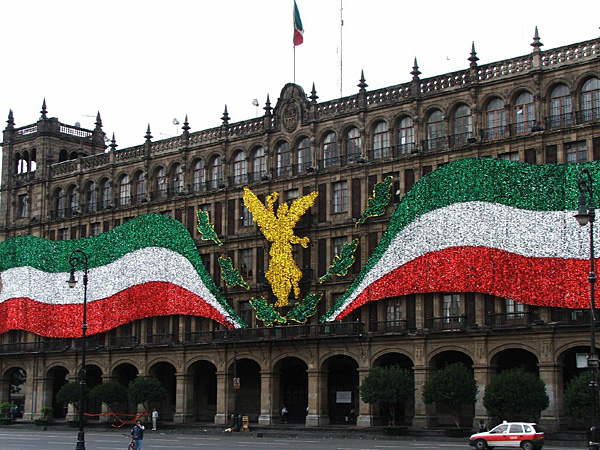
|  |  |  Vallarta Living Vallarta Living  
Preparations for Mexican Independence Day
 Ron C. Walker - PVNN Ron C. Walker - PVNN
September 01, 2010


| | On September 15th and 16th Mexican Independence is celebrated throughout the country, with a variety of activities. | |
 |
In a few days, Mexico will celebrate the 200th Anniversary of its Independence. At 11:00 p.m. the night of September 15th, "Viva Mexico!" will be shouted throughout the country and anywhere Mexicans gather. The celebration will continue into September 16th.

After that, international news will return to the daily events of their own country and the world. For those who take a greater interest in Mexico, however, this will be just the beginning of a 10-year historical reenactment of the War of Independence, concluded in 1821.

With the conclusion of 200th Anniversary of Mexican Independence in September, Mexico will begin preparing for a second dramatic event of the country’s history with the 100th Anniversary of the initiation of the Revolution on November 20, 1910.

As with many historical events, it is often necessary to begin with where we are today and then look back in history to appreciate the full impact of these events in shaping Mexico. This is how I would suggest that you begin preparations for Mexican Independence Day. If you take note of some of the articles in the Mexican press in the coming weeks, and years, you will find a rich source of information of how Mexico has developed from these two seminal events.

In an editorial in the July 24, 2010, edition of El Informador, a respected newspaper in Guadalajara, there is an interesting comment by Flavio Romero de Velasco:

"Reflections: In the political history of Mexico, democracy has not fared well. During the 187 years of independent Mexico (1821-2008), there have only been three attempts at a democratic system: The Restored Republic (1867-1876), the government of Madero (1911-1913) and the government of Fox (2000-2006). Sixteen years of liberty is practically nothing compared to all the rest. Also, this vast historical experience has developed a problem: not only do we not know very well how democracy works, we know all too well how to make it not work."

An interesting comment from a former governor of the State of Jalisco and an impression of Mexico often heard in national conversations. Continuing with this reflection by Romero de Velasco, an article in the same newspaper of August 9, 2010, by José de Jesús Covarrubias Duenas makes the following observations:

"...irreconcilable differences between liberals and conservatives, the Catholic Church and the Masons, Juaristas (Benito Juarez) and Porfiristas (Porfirio Diaz), Villistas (Francisco Villa) and Obregonistas (Alvaro Obregon) and today among different political parties who struggle for power itself, regardless of the consequences."

A reference to the long history of opposing groups in their quest for political power in the country. Covarrubias continues, "In addition to the reasons already stated (lack of defined public policies), is that the Mexican government, for 200 years, is based on improvisation. A class of efficient public administrators has never been developed..."

"To this, we should add the centralist vision which exists in the country. This has not changed since the time of the Aztecs." In addition, if we include the enormous ignorance of a large part of the population, fed with bread and circus (pan y circo), telenovelas, pandering to other vices and the constant drug situation..."

Taking into account Covarrubias’ observations of a long history of centralist governments, without defined policies and a nonparticipating public, we can easily arrive at a conclusion that democracy, as practiced in Mexico, remains considerably different than that practiced in North America, both historically and today. Romero de Velasco would agree.

Perhaps one of the biggest lessons to learn in our preparation for Independence Day in Mexico is that Mexico has a very different concept of government than what has developed in North America. As we embark on the next decade of recounting the independence movement and revolution of Mexico with the celebration of Independence Day on September 15th, we can better appreciate how the Mexican concept of government developed and, as a result, better understand the Mexico of today. All of this can be found in something as readily available as the local newspapers.

Ron C. Walker is an active member of the Grupo Ecolňgico de Puerto Vallarta, A.C., a non-profit organization. He was also the recipient of the coveted Vallarta Award for his tireless work for the benefit of this area’s environment. Ron can be reached by email at: rcwalker45(at)hotmail.com or grupoecologicopv(at)yahoo.com.mx. Website: GrupoEcologico.com |

 |
|  |



